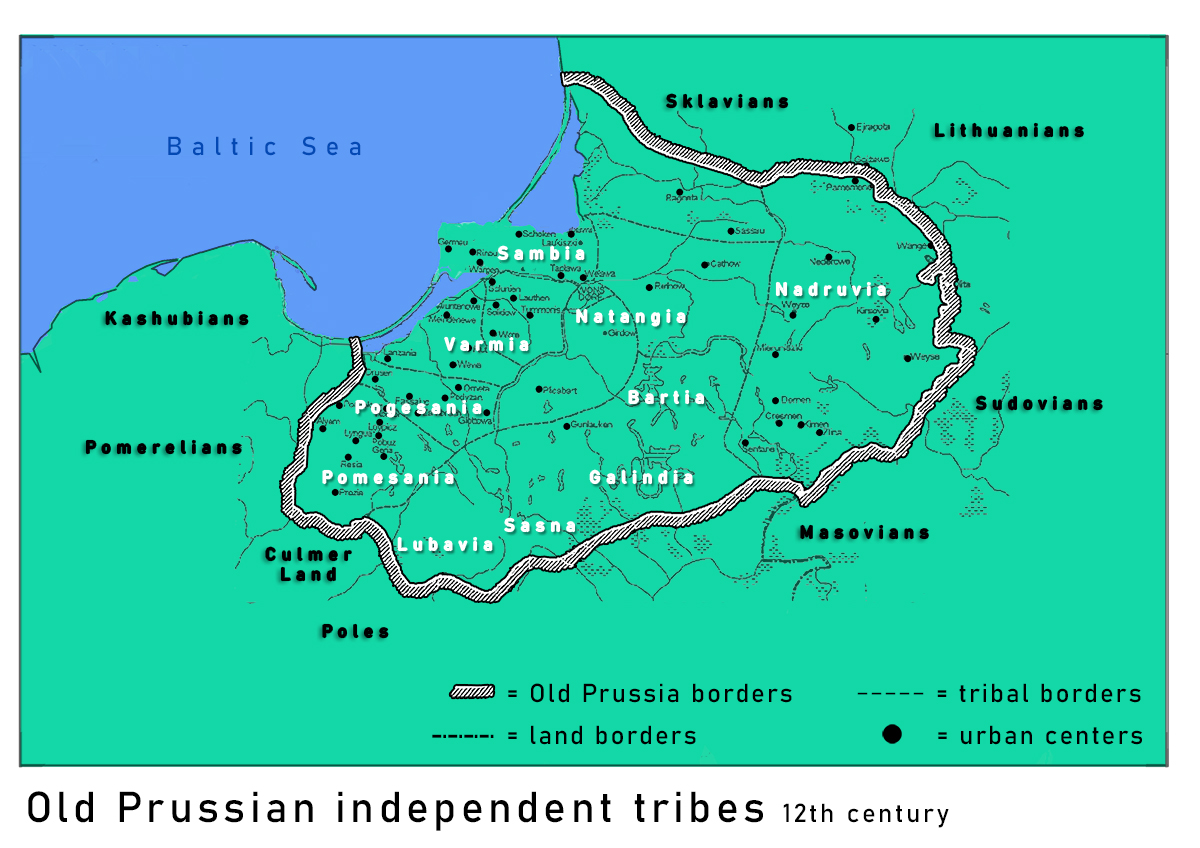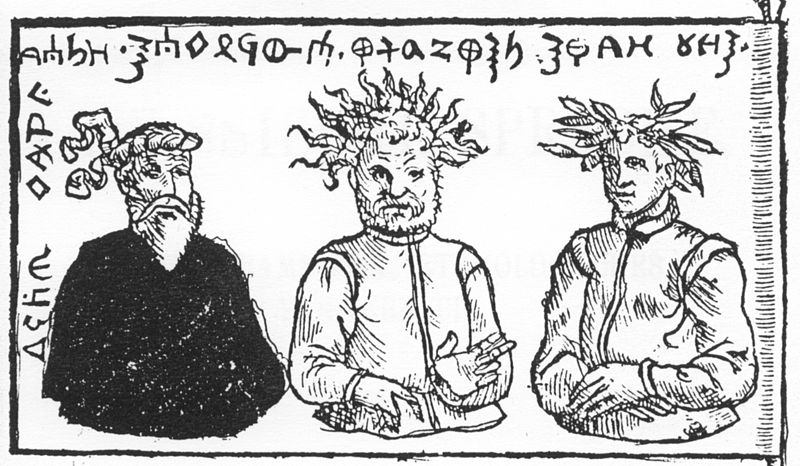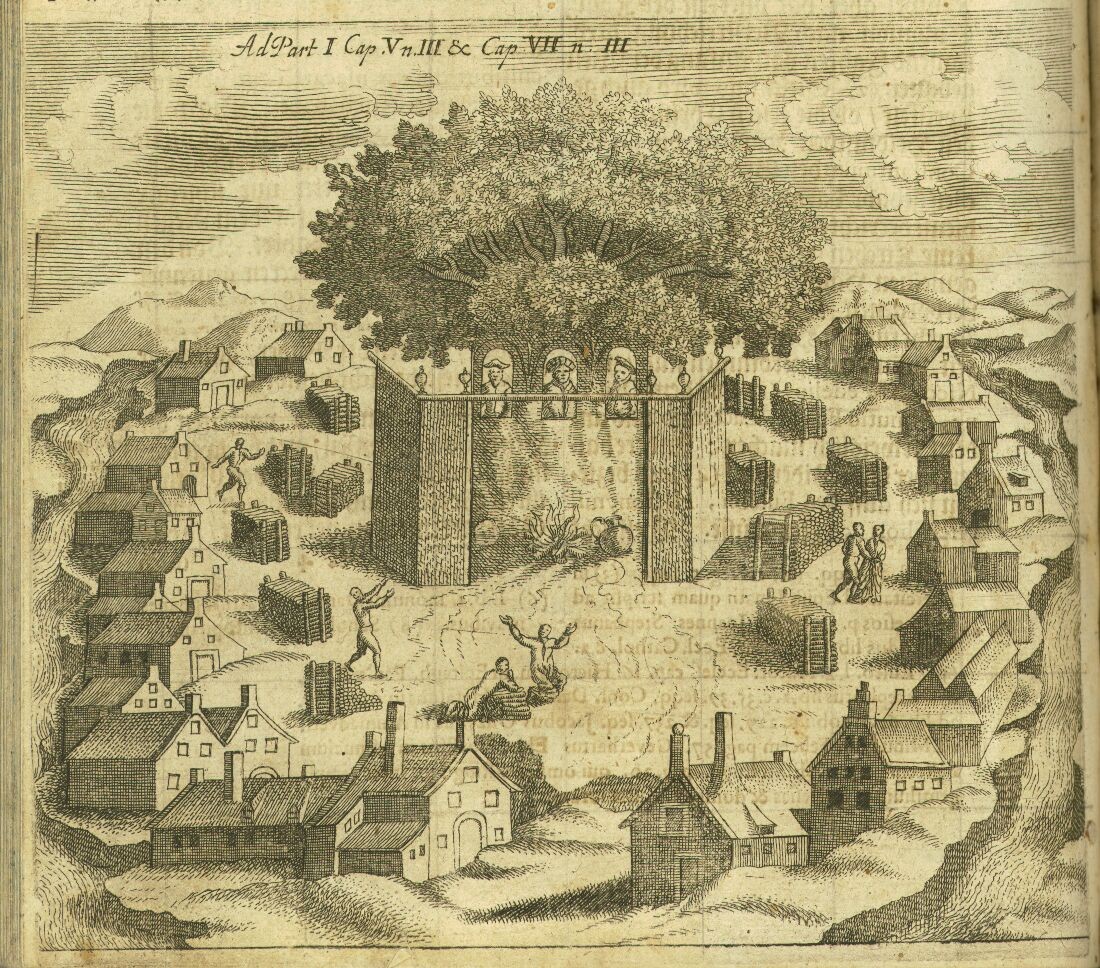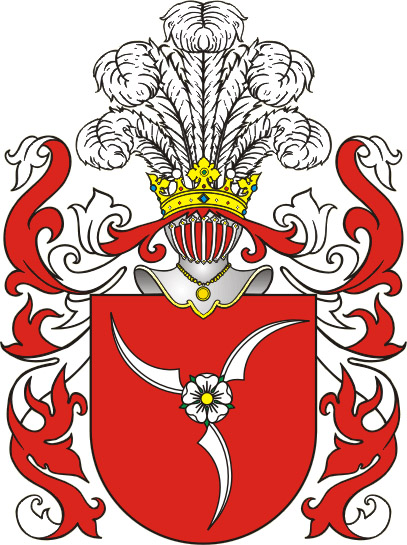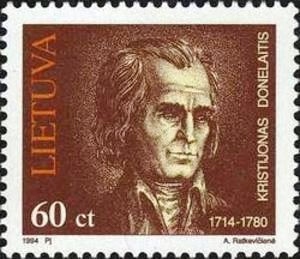|
Kriwe-Kriwajto
''Kriwe Kriwaito'' ( lv, krīvu krīvs, lt, krivių krivaitis) or simply ''Kriwe'' ( lv, krīvs, lt, krivis) was the chief priest in the Baltic mythology. Known primarily from the dubious 16th-century writings of Simon Grunau, the concept of ''kriwe'' became popular during the times of romantic nationalism. However, lack of reliable written evidence has led some researchers to question whether such pagan priest actually existed. The title was adopted by Romuva, the neo-pagan movement in Lithuania, when Jonas Trinkūnas was officially installed as ''krivių krivaitis'' in October 2002. Written sources Peter of Dusburg wrote about ''kriwe'' in his chronicle ''Chronicon terrae Prussiae'' finished in 1326. According to him, ''kriwe'' lived in Romuva and was respected as a Catholic pope not only by the Old Prussians but also by other Baltic tribes. His envoys carried a certain rod (Latin: ''baculum'') or another symbol and commanded respect both from the nobles and the paupers. '' ... [...More Info...] [...Related Items...] OR: [Wikipedia] [Google] [Baidu] |
Old Prussians
Old Prussians, Baltic Prussians or simply Prussians (Old Prussian: ''prūsai''; german: Pruzzen or ''Prußen''; la, Pruteni; lv, prūši; lt, prūsai; pl, Prusowie; csb, Prësowié) were an indigenous tribe among the Baltic peoples that inhabited the region of Prussia, at the south-eastern shore of the Baltic Sea between the Vistula Lagoon to the west and the Curonian Lagoon to the east. The Old Prussians, who spoke an Indo-European language now known as Old Prussian and worshipped pre-Christian deities, lent their name, despite very few commonalities, to the later, predominantly Low German-speaking inhabitants of the region. The duchy of the Polans under Mieszko I, which was the predecessor of the Kingdom of Poland, first attempted to conquer and baptize the Baltic tribes during the 10th century, but repeatedly encountered strong resistance. Not until the 13th century were the Old Prussians subjugated and their lands conquered by the Teutonic Order. The remaining Old Prus ... [...More Info...] [...Related Items...] OR: [Wikipedia] [Google] [Baidu] |
Widewuto
Widewuto (also ''Viduutus'', ''Vidvutus'', ''Witowudi'', ''Waidewut'', ''Vaidevutis'') was a legendary king of the pagan Prussians who ruled along with his elder brother, the high priest (''Kriwe-Kriwajto'') Bruteno in the 6th century AD. They are known from writings of 16th-century chroniclers , Simon Grunau, and Lucas David. Though the legend lacks historical credibility, it became popular with medieval historians. It is unclear whether the legend was authentically Prussian (i.e. recorded from Prussian mythology) or was created by Grunau (possibly inspired by Biblical Moses and Aaron), though Lithuanian researchers tend to support its authenticity. Names Widewuto's name is found in literature in different forms: Veijdenutus, Vydevutis, Vidowuto, Viduutus, Waidewut, Wejdewut, Wenedut, Widewuto, Widewutte, Widiwutus, Wydowudo, Wydowudus, Widowuto, Wydowuto, Widowutus, Witoud, Witoudo, Witouito, Witowudus, Witowuto, Wotowudo, Vaidevutis (modern Lithuanian emendation). As for his bro ... [...More Info...] [...Related Items...] OR: [Wikipedia] [Google] [Baidu] |
Romuva (temple)
Romuva or Romowe (also known as Rickoyoto in the writings of Simon Grunau) was an alleged pagan worship place (a temple or a sacred area) in the western part of Sambia, one of the regions of pagan Prussia. In contemporary sources the temple is mentioned only once, by Peter von Dusburg in 1326. According to his account, Kriwe-Kriwajto, the chief priest or "pagan pope", lived at Romuva and ruled over the religion of all the Balts. According to Simon Grunau, the temple was central to Prussian mythology. Even though there are considerable doubts whether such a place actually existed, the Lithuanian neo-pagan movement '' Romuva'' borrowed its name from the temple. Historical accounts According to Peter von Dusburg, writing in 1326, the name ''Romuva'' is derived from the word Rome. He describes the Kriwe as a powerful priest who was held in high regard by the Prussians, Lithuanians, and Balts of Livonia. His messengers were recognized by a certain rod or other insignia. He guarded th ... [...More Info...] [...Related Items...] OR: [Wikipedia] [Google] [Baidu] |
Augustinus Rotundus
Augustinus Rotundus ( pl, Augustyn Rotundus, lt, Augustinas Rotundas, 1520–1582) was a Christian and Renaissance humanist, erudite, jurist, political writer, first historian and apologist of Lithuania. Rotundus was vogt of Vilnius, general secretary to the Grand Duke and King Sigismund Augustus and elder of Stakliškės. After his nobilitation to the szlachta, Rotundus adopted surname Mieleski, or Milewski. Biography Rotundus was born in Wieluń around year 1520. His surname is supposed to be "Mieleski", although some researchers suggest that it was adopted later. ''Rotundus'' is translated nickname, probably inherited from his father – Mikołaj ( en, Nickolas) "Okrągły" ( la, Rotundus), who was a rich furrier in the city of Wieluń. Rotundus studied in University of Wittenberg and Lubrański Academy in Poznań, where he was suspected of writing a nasty lampoon about Poznań catholic chapter. Undoubtedly Rotundus was a passionate catholic after graduation and supported ... [...More Info...] [...Related Items...] OR: [Wikipedia] [Google] [Baidu] |
Marcin Kromer
Marcin Kromer (Latin: ''Martinus Cromerus''; 11 November 1512 – 23 March 1589) was Prince-Bishop of Warmia (Ermland), a Polish cartographer, diplomat and historian in the Kingdom of Poland and later in the Polish–Lithuanian Commonwealth. He was a personal secretary to two Kings of Poland, Sigismund I the Old and Sigismund II Augustus. Biography Kromer was born in 1512 into a prominent burgher family of German descent in Biecz, in Lesser Poland. He completed his basic education in a local church-run school. In 1528 he transferred to Kraków, where in 1530 he graduated as a bachelor at the Cracow Academy. In 1533–37 he worked at the Royal Chancellery in Kraków. Thereafter he went to Italy, where he studied law for two years. Returning to Poland in 1540, he became secretary to Archbishop Piotr Gamrat. As the latter's personal advisor, he was also his envoy and representative to Rome, where he spent two years until 1544. He then became a canon in Kraków. In 1545, upon the deat ... [...More Info...] [...Related Items...] OR: [Wikipedia] [Google] [Baidu] |
Jonas Bretkūnas
Jonas Bretkūnas, Johann(es) Bretke, also known as Bretkus (born 1536 in Bammeln near Friedland – 1602 Königsberg was a Lutheran pastor and was one of the best known developers of the written Lithuanian language. He translated the Bible into Lithuanian, was the author of twelve Lithuanian books, and a historian as well. Biography Jonas Bretkūnas, Johann(es) Bretke was born in Duchy of Prussia (a fief of Poland) in 1536. His father was German (according to Gerullis) or Germanized Prussian, and his mother from a native Prussian family. The language spoken in the area was primarily German, while Jonas Bretkūnas' mother tongues were Old Prussian and Lithuanian. Lithuanian language was also used in state chancellery as well. Different people, who had come to Lutheran Prussia did at the time, because the Lutherans had promised to preach in languages people understood rather than Latin. The Duke of Prussia therefore arranged for the education and studies of languages for pastors. In ... [...More Info...] [...Related Items...] OR: [Wikipedia] [Google] [Baidu] |
The Seasons (poem)
The Seasons ( lt, Metai) is the first Lithuanian poem written by Kristijonas Donelaitis around 1765–1775. It is in quantitative dactylic hexameters as often used for Latin and Ancient Greek poetry. It was published as "''Das Jahr''" in Königsberg, 1818 by Ludwig Rhesa, who also named the poem and selected the arrangement of the parts. The German translation was included in the first edition of the poem. The book was dedicated to Wilhelm von Humboldt. The poem is considered a masterpiece of early Lithuanian literature. Synopsis The poem consists of 4 parts: "Spring Joys" (''Pavasario linksmybės''), "Summer Toils" (''Vasaros darbai''), "Autumn Boons" (''Rudenio gėrybės''), and "Winter Cares" ''(Žiemos rūpesčiai)''. In these 4 idylls, totaling 2997 hexameters, are depicted the natural setting of Lithuania Minor, its people, their work, and their customs. The poem depicts a realistic portrayal of Lietuvininkai (Prussian Lithuanians) peasants' life in the middle 18th cen ... [...More Info...] [...Related Items...] OR: [Wikipedia] [Google] [Baidu] |
Kristijonas Donelaitis
Kristijonas Donelaitis ( la, Christian Donalitius; 1 January 1714 – 18 February 1780) was a Prussian Lithuanian poet and Lutheran pastor. He lived and worked in Lithuania Minor, a territory in the Kingdom of Prussia, that had a sizable Lithuanian-speaking minority. He wrote the first classic Lithuanian language poem, '' The Seasons'' ( lt, Metai), which became one of the principal works of Lithuanian poetry. The poem, a classic work of Lithuanian literature, depicts everyday life of Lithuanian peasants, their struggle with serfdom, and the annual cycle of life. Early life Donelaitis was born at Lasdinehlen estate near Gumbinnen, Prussia. His parents were free peasants who owned the land that they cultivated. His father died in 1720, leaving seven children (four sons and three daughters). One of his three brothers, Friedrich, became a goldsmith in Königsberg. Another brother, Michael, inherited the father's farm. His third brother, Adam, became a blacksmith and innkeeper. In 1 ... [...More Info...] [...Related Items...] OR: [Wikipedia] [Google] [Baidu] |
Matthäus Prätorius
Matthäus Prätorius (c.1635–c.1704) was a Protestant pastor, later a Roman Catholic priest, a historian and ethnographer. Prätorius is thought to have been born in Memel (Klaipėda). He probably grew up speaking both German and Lithuanian, which helped him when preaching to the ethnic Lithuanians in Ducal Prussia. His work about Prussia and its culture, ''Deliciae Prussicae, oder Preussische Schaubühne'', resembles the work of Christoph Hartknoch, with whom he collaborated. Prätorius' work provides much more ethnographic information regarding local Lithuanians and Old Prussians. It was only published partially, in 1725 (in ''Erleutertes Preußen''), 1731 (in ''Acta Borussica'') and 1871. A complete edition, in seven volumes, with original German text and Lithuanian translation, is under preparation in Lithuania. In 1701, having converted from Protestantism to Roman Catholicism, he appealed against an ongoing case of witch-hunt. He died in Wejherowo (Weyherststadt). ... [...More Info...] [...Related Items...] OR: [Wikipedia] [Google] [Baidu] |
Kyrios
''Kyrios'' or ''kurios'' ( grc, κύριος, kū́rios) is a Greek word which is usually translated as "lord" or "master". It is used in the Septuagint translation of the Hebrew scriptures about 7000 times, in particular translating the name God YHWH (the Tetragrammaton), and it appears in the Koine Greek New Testament about 740 times, usually referring to Jesus.''The Christology of the New Testament'' by Oscar Cullmann 1959 pages 234-23/ref> Classical Greece In Classical Athens, the word ''kyrios'' referred to the head of the household, who was responsible for his wife, children, and any unmarried female relatives. It was the responsibility of the ''kyrios'' to arrange the marriages of his female relatives, provide their dowries, represent them in court, if necessary, and deal with any economic transactions they were involved in worth more than a ''medimnos'' of barley. When an Athenian woman married, her husband became her new ''kyrios''. The existence of the system o ... [...More Info...] [...Related Items...] OR: [Wikipedia] [Google] [Baidu] |
Lithuanian Chronicles
The Lithuanian Chronicles ( lt, Lietuvos metraščiai, also called Belarusian-Lithuanian Chronicles) are three redactions of chronicles compiled in the Grand Duchy of Lithuania. All redactions were written in the Ruthenian language and served the needs of Lithuanian patriotism. The first edition, compiled in the 1420s, glorified Vytautas the Great and supported his side in power struggles. The second redaction, prepared in the first half of the 16th century, started the myth of Lithuanian Roman origin: it gave a fanciful genealogy of Palemon, a noble from the Roman Empire who founded the Grand Duchy. This noble origin of Lithuanians was important in cultural rivalry with the Kingdom of Poland. The third redaction, known as the Bychowiec Chronicle, elaborated even further on the legend, but also provided some useful information about the second half of the 15th century. The three redactions, the first known historical accounts produced within the Grand Duchy, gave rise to the historiog ... [...More Info...] [...Related Items...] OR: [Wikipedia] [Google] [Baidu] |
Iron Wolf (character)
The Iron Wolf ( lt, Geležinis Vilkas) is a mythical character from a medieval legend of the founding of Vilnius, the capital city of the old Grand Duchy of Lithuania and modern Republic of Lithuania. First found in the Lithuanian Chronicles, the legend shares certain similarities with the Capitoline Wolf and possibly reflected Lithuanian desire to showcase their legendary origins from the Roman Empire (see the Palemonids). The legend became popular during the era of Romantic nationalism. Today Iron Wolf is one of the symbols of Vilnius and is used by sports teams, Lithuanian military, scouting organizations, and others. Legend According to the legend, Grand Duke Gediminas (ca. 1275 – 1341) was hunting in the sacred forest near the Valley of Šventaragis, near where Vilnia River flows into the Neris River. Tired after the successful hunt of an aurochs, the Grand Duke settled in for the night. He fell soundly asleep and dreamed of a huge Iron Wolf standing on top a hill and how ... [...More Info...] [...Related Items...] OR: [Wikipedia] [Google] [Baidu] |
